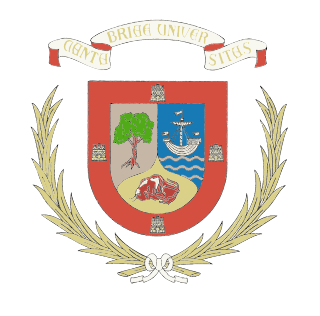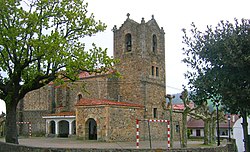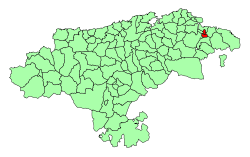
Cantabria is an autonomous community and province in northern Spain with Santander as its capital city. It is called a comunidad histórica, a historic community, in its current Statute of Autonomy. It is bordered on the east by the Basque autonomous community, on the south by Castile and León, on the west by the Principality of Asturias, and on the north by the Cantabrian Sea.

University of Cantabria (UC), is a public university located in Santander, Torrelavega and Comillas in Cantabria, Spain. It was founded in 1972 and is organized in 15 schools and colleges.
The Regionalist Party of Cantabria is the second oldest political party in the Spanish Autonomous Community of Cantabria. The PRC originated in the Association in Defense of the Interests of Cantabria (ADIC), founded on 14 May 1976, with the objective of promoting Cantabrian autonomy.

The Cantabria autonomous football team is the regional football team for Cantabria, Spain. They are not affiliated with FIFA or UEFA and therefore are only allowed to play friendly matches.
The Divisiones Regionales de Fútbol in the Cantabria, are organized by the Cantabrian Football Federation:

The Asón-Agüera comarca is a historical region of Cantabria, Spain. It is located in the upper courses of the Asón and Agüera rivers, near the border with Vizcaya in the Basque Country. The comarca encompasses the basin of the Asón river and its tributaries such as the Gándara.

Ampuero is a municipality located in the autonomous community of Cantabria, Spain. It is surrounded by the municipalities of Limpias, Liendo, Voto, Guriezo and Rasines. Its strategic location in the centre of the Asón-Agüera County has made it the County head town, which contributes to important services and an industrial area in its surroundings. This town has various outdoor activities such as trout and salmon fishing, that provides an exquisite gastronomy. The Virgen Niña festivities, declared of regional touristic interest, have the popular encierros. Ampuero has a 32.3 squared km area, and it is located 55 km away from Santander. According to the 2007 census, the city has a population of 3.682 inhabitants.
The Santoña, Victoria and Joyel Marshes Natural Park is an estuary in Cantabria, protected as a natural park. It is one of the wetlands of most ecological value in the north of Spain, and is used as a winter refuge and migratory passage by many species of birds and fishes.

SS Cantabria was a Spanish-owned cargo steamship that was built in 1919 in Canada and sunk in 1938 in a naval action in the Spanish Civil War in the North Sea. She was built as War Chief, renamed Alfonso Pérez shortly after she was built, and renamed Cantabria during the Spanish Civil War.

Rayo Cantabria, formerly known as Real Racing Club de Santander "B" is the reserve team of Racing de Santander, a Spanish football team based in Santander, in the autonomous community of Cantabria.
Manos Limpias is a trade union registered in Spain, allegedly representing employees of the Spanish public services. The group was founded in Madrid in 1995 by Spanish lawyer Miguel Bernad Remón, a notable figure within the Spanish extreme right, who entered politics as a protege of Blas Piñar, during his tenure as the Fuerza Nueva and National Front party secretary. The group takes their name from the Mani Pulite judiciary movement in Italy, instigated by Antonio Di Pietro.

Cave del Valle, locally also known as La Viejarrona, is located near El Cerro Village in the municipality of Rasines in Cantabria, northern Spain. The cave is the source of the Silencio River, a tributary of the Rio Ruahermosa, which in turn is a tributary of the Asón River. Notable for its prehistoric, but particularly for its speleologic significance as it is recognized as one of the longest cavities in the world. The site is very popular among cavers, who have explored a total of over 60 km (37.28 mi) so far.
"Himno a la Montaña", or "Himno de Cantabria", is the official anthem of the Spanish autonomous community of Cantabria. It was composed in 1926 by Juan Guerrero Urresti at the behest of the then Provincial Council of Santander, and subsequent arrangements were made by José del Río Sainz, establishing it as the region's official anthem.

A Cantabrian albarca is a rustic wooden shoe in one piece, which has been used particularly by the peasants of Cantabria, Spain. In the neighbouring province of Asturias madreñas are still being widely used in rural areas.

The 2015 Cantabrian regional election was held on Sunday, 24 May 2015, to elect the 9th Parliament of the autonomous community of Cantabria. All 35 seats in the Parliament were up for election. The election was held simultaneously with regional elections in 12 other autonomous communities and local elections all throughout Spain.

The 2023 Cantabrian regional election was held on Sunday, 28 May 2023, to elect the 11th Parliament of the autonomous community of Cantabria. All 35 seats in the Parliament were up for election. The election was held simultaneously with regional elections in eleven other autonomous communities and local elections all throughout Spain.

La Chica que Limpia also known in English as The Cleaning Lady is a Spanish-language Argentinian dramatic television show. The television series has been remade as La muchacha que limpia in Mexico, and as The Cleaning Lady in the United States. It debuted in 2017 on Cine.ar Play, and later aired on Canal 10 Cordoba. The series is composed of 13 episodes for a 30-minute timeslot. The television program won the Martín Fierro de Oro award in 2018.

Paradores de Turismo de España S.M.E.S.A., branded as Paradores, is a Spanish state-owned chain of luxury hotels that are usually located in historic buildings or in nature areas with a special appeal. Its very first parador was inaugurated on 9 October 1928 in Navarredonda de Gredos (Ávila). As of 2023, it operates ninety-seven paradores in Spain and one in Portugal, with 5,986 rooms in total. Every parador has its own restaurant offering the regional gastronomy of its area.

















